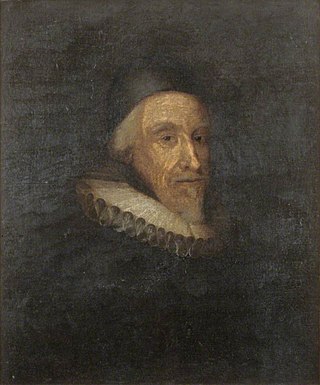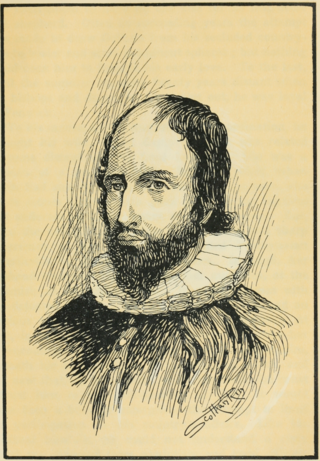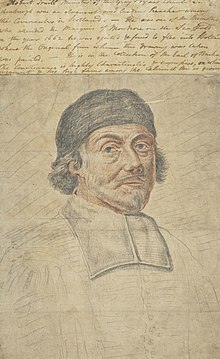
Andrew Cant (1584–1663) was a Presbyterian minister and leader of the Scottish Covenanters. About 1623 the people of Edinburgh called him to be their minister, but he was rejected by James I. Ten years later he was minister of Pitsligo in Aberdeenshire, a charge which he left in 1638 for that of Newbattle in Midlothian. In July of that year he went with other commissioners to Aberdeen in the vain attempt to induce the university and the presbytery of that city to subscribe the National Covenant, and in the following November sat in the general assembly at Glasgow which abolished episcopacy in Scotland. In 1638 Cant was minister of Pitsligo in Aberdeenshire. In 1640 he was chaplain to the Scottish army and then settled as minister in Aberdeen. Though a staunch Covenanter, he was a zealous Royalist, preaching before Charles I in Edinburgh, and stoutly advocating the restoration of the monarchy in the time of the Commonwealth. Cant's frequent and bitter verbal attacks on various members of his congregation led in 1661 to complaints laid before the magistrates, in consequence of which he resigned his charge.

Robert Blair was a Scottish presbyterian minister who became a Westminster Divine and Moderator of the General Assembly of the Church of Scotland in 1646, after failing to emigrate to Boston in 1636.

John Nisbet (1627–1685) was a Scottish covenanter who was executed for participating in the insurgency at Bothwell Brig and earlier conflicts and for attending a conventicle. He took an active and prominent part in the struggles, of the Covenanters for civil and religious liberty. He was wounded and left for dead at Pentland in 1666 but lived and fought as a captain at Bothwell Bridge, in 1679. He was subsequently seized and executed as a rebel. He was a descendant of Murdoch Nisbet, a Lollard who translated the Bible into the Scots language.
Robert Fleming the elder was a Scottish Presbyterian Minister. Following the Restoration of King Charles II, he declined to accept the authority of the newly imposed bishops in the Kirk. He was therefore ejected as minister at Cambuslang. For the next ten years he remained in Scotland, preaching as he had opportunity. In 1669 he published the first part of Fulfilling of the Scripture in Rotterdam; it was later expanded to 3 parts and it is for this work and other treatises that Fleming is chiefly remembered. On 3 September 1672 he declined indulgence at Kilwinning, disobeyed a citation of the Privy Council, and fled to London, where his Scottish speech somewhat marred his usefulness. On 30 December 1677 he was admitted colleague to John Hog, minister of the Scots Kirk, Rotterdam. After the Revolution he might have been restored to Cambuslang, but preferred to remain in Holland. While on a visit to London, he died of fever, 25 July 1694, after a short illness. Daniel Burgess preached at his funeral and also recorded some memoirs of Fleming's life.

William Guthrie (1620–1665) was a Scottish Covenanter minister and author. He was the first minister of Fenwick parish church in Ayrshire, Scotland. He is known primarily for his book on assurance, The Christian's Great Interest.

James Guthrie, was a Scottish Presbyterian minister. Cromwell called him "the short man who would not bow." He was theologically and politically aligned with Archibald Johnston, whose illuminating 3 volume diaries were lost until 1896, and not fully published until 1940. He was exempted from the general pardon at the restoration of the monarchy, tried on 6 charges, and hanged in Edinburgh.
John Nevay was a Scottish Covenanter. He was the nephew of Andrew Cant, minister of Aberdeen. He graduated with an M.A. from King's College, Aberdeen, in 1626. He worked as tutor to George, Master of Ramsay. He was licensed by the Presbytery of Dalkeith 14 October 1630 on the recommendation of that of Alford, but left its bounds a fortnight after. He was admitted about 1637 and appointed in 1647 a member of committee to revise the Psalter. He was present at Mauchline Moor in opposition to the royal army in June 1648. He was subsequently pardoned by Parliament on 16 January 1649. Nevay was appointed a commissioner by Parliament for visiting the University of Aberdeen 31 July 1649. He was active in raising the western army in 1650, and in 1651 a prominent supporter of the Protesters. In 1654 he was named by the Council of England on a committee for authorising admissions to the ministry in the province of Glasgow and Ayr. On 23 December 1662 he was banished by the Privy Council from His Majesty's dominions and went to Holland, where he died in 1672, aged about 66.

Robert Dick of Prestonpans was a 17th-century merchant and inspector of salt works to Lord Carringtoune. He was arrested on 4 September 1676 for attending an open-air service in the Pentland Hills.

Robert Traill was a church minister at Cranbrook in Kent. He was born at Elie in Fife in 1642. He was incarcerated on the Bass Rock, an island in the Firth of Forth from July 19, 1677 to October 5, 1677. His work was often quoted by J. C. Ryle and is still published in the 21st century.
John Rae was an English parish minister.

Alexander Forrester (1611–1686) was a Scottish minister of the 17th century.

John Law (1632–1712) was a 17th-century Presbyterian minister from Scotland. He became Moderator of the General Assembly in 1694 and later was a prisoner on the Bass Rock.
Thomas Ross of Nether Pitkerrie, was born about 1614. He was the son of George Ross of Nether Pitkerrie. He continued in Kincardine after the establishment of prelacy and owes his leaving to a meeting with John M'Gilligan.

Robert MacWard, a covenanting minister, appears to have studied at the University of St. Andrews, where he was for some time regent of humanity. In 1654 he was appointed one of the regents of Glasgow University without competition on 4 August 1653, but resigned the appointment from ill-health, and on 8 September was ordained to the collegiate charge of the Outer High Church, Glasgow, the usual ordination trials being dispensed with. From 1656 to 1659 he had charge of the south district of the parish, in 1660 of the west, and in 1661 of the east. In 1659 he was named for the vice-chancellorship of the university, but the proposal, which was opposed by Robert Baillie, who seems always to have borne him a grudge, was unsuccessful.
John Brown, of Wamphray, church leader, was probably born at Kirkcudbright; he graduated at the university of Edinburgh 24 July 1630. He was probably not settled till 1655, although he comes first into notice in some highly complimentary references to him in Samuel Rutherford's letters in 1637. In the year 1655 he was ordained minister of the parish of Wamphray in Annandale. For many years he seems to have been quietly engaged in his pastoral duties, in which he must have been very efficient, for his name still lives in the district in affectionate remembrance. After the restoration he was not only compelled by the acts of Parliament of 1662 to leave his charge, but he was one of a few ministers who were arrested and banished, owing to the ability and earnestness with which they had opposed the arbitrary conduct of the king in the affairs of the church. On 6 November 1662 he was sentenced to be kept a close prisoner in the Tolbooth of Edinburgh, his crime being that he had called some ministers ‘false knaves’ for keeping synod with the archbishop. The state of the prison causing his health to break down, he was banished 11 December from the king’s dominions, and ordered not to return on pain of death. He went to Holland. In 1676 Charles II urged the States-General to banish him from their country, a step which they refused to take. For a few years he was minister of the Scottish church in Rotterdam, and shortly before his death, which occurred in 1679, he took part in the ordination of Richard Cameron.
William Row (1563–1634) was a Scottish presbyterian divine.

Hugh Mackail, Scottish martyr, was born about 1640 at Liberton, near Edinburgh. His father was Matthew Mackail who was minister at Bothwell before being deprived of his ministry by the government in 1662. At an early age he went to reside with an uncle, Hugh Mackail, one of the ministers of Edinburgh. He entered the University of Edinburgh, studying divinity, where he distinguished himself, graduating, as the records show, in 1658 under Thomas Crawford. Shortly afterward he became chaplain and tutor in the family of Sir James Stuart of Coltness and Goodtrees, then Lord Provost of Edinburgh. In 1661, being then in his twenty-first year, he was licensed by the Presbytery of Edinburgh and afterward preached several times with much success. A sermon which he delivered in the High Church, Edinburgh, in September 1662, in which he declared that "the church of Scotland had been persecuted by an Ahab on the throne, a Haman in the state, and a Judas in the church," gave such offence that a party of horse was sent to apprehend him. He escaped, however, and, after lying concealed in his father's house in Bothwell for some time, retired into Holland, where he improved his time by studying for several years perhaps near Rotterdam. Then, returning to Scotland, he lived chiefly at his father's house, until in November 1666 he joined a rising of the covenanters. After nine days' marching, however, his weak health obliged him to leave the insurgents, and on his way back to Liberton he was arrested, carried to Edinburgh, and committed to the Tolbooth. He was several times brought before the council and tortured with the boot. Finally, after trial, despite the efforts of his cousin, Matthew Mackail, an apothecary, who interceded with James Sharp, archbishop of St. Andrews, on his behalf, Hugh was hanged at the market-cross of Edinburgh on 22 December 1666, amid "such a lamentation," says Kirkton, "as was never known in Scotland before, not one dry cheek upon all the street, or in all the numberless windows in the market-place." According to MS. Jac. V. 7. 22, in the Advocates' Library, "immediately after the execution of the aforementioned four men there came a letter from the king, discharging the executing of more; but the Bishop of St. Andrews kept it up till Mr. Hew was executed," Mackail behaved with great fortitude on the scaffold, addressing the crowd with singular impressiveness. He was buried in Greyfriars churchyard. Wodrow describes him as "universally beloved, singularly pious, and of very considerable learning."

William Gordon was a 17th-century landowner and Covenanter. He is remembered as being a correspondent in Samuel Rutherford's Letters and being one of the biographies in John Howie's Scots Worthies. He was regarded as a man of strong religious convictions and piety. In 1664 he was banished for listening to ministers who lacked a government licence, both at his mother's house and in the woods. He arrived at the Battle of Bothwell Bridge after the fighting was over and, hesitating to surrender, was shot.
James Wood was a Covenanter and Church of Scotland minister. He was appointed to be Professor of Divinity and Principal of the Old College, St. Andrews by Cromwell's government. He was deposed after the Restoration under the influence of Archbishop Sharp in 1663. He was then holding Presbyterian principles at a time when Charles II was promoting Prelacy. He died in 1664.

John King was an outlawed minister of the Covenant, chaplain at one time to Lord Cardross, but seized by Claverhouse among the insurgents after the affair at Drumclog. King was taken to Edinburgh along with another preacher named John Kid. They were each subjected to torture, condemned to death, and executed. Following his death King's head and limbs were displayed at the Netherbow Port on Edinburgh's Royal Mile beside James Guthrie's skull.
















